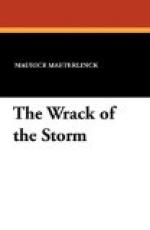ourselves and because she makes herself beloved by
all who know her. But we entertained no hatred
of Germany. It is true that, in spite of the virtues
which we believed her to possess but which were merely
the mask of a spy, our hearts barely responded to
her obsequiously treacherous advances. For the
German, of all the inhabitants of our planet, has this
one and singular peculiarity, that he arouses in us,
from the onset, a profound, instinctive, intuitive
feeling of antipathy. But, even so and wherever
our preferences may have lain, our treaties, our pledged
word, the very reason of our existence, all forbade
us to take part in the conflict. Then came the
incredible ultimatum, the monstrous demand of which
you know, which gave us twelve hours to choose between
ruin and death or dishonour. As you also know,
we did not need twelve hours to make our choice.
This choice was no more than a cry of indignation
and resolution, spontaneous, fierce and irresistible.
We did not stay for a moment to ponder the extenuating
circumstances which our weakness might have invoked.
We did not for a moment consider the absolution which
history would have granted us later, on realizing
that a conflict between forces so completely disproportioned
was futile, that we must inevitably be crushed, massacred
and annihilated and that the sacrifice of a little
people in its entirety could prevent nothing, could
barely cause delay and would have no weight in the
immense balance into which the world’s destinies
were about to be flung. There was no question
of all this; we saw one thing only: our plighted
word. For that word we must die; and since then
we have been dying. Trace the course of history
as far back as you will; question the nations of the
earth; then name those who have done or who would
have done what we did. How many will you find?
I am not judging those whom I pass over in silence,
for to do so would be to enter into the secret of
men’s hearts which I have not the right to violate;
but in any case there is one which I can name aloud,
without fear of being mistaken; and that is the British
nation. This people too entered into the conflict,
not through interest or necessity or inherited hatred,
but simply for a matter of honour. It has not
suffered what we have suffered; it has not risked
what we have risked, which is all that we possessed
beneath the arch of heaven; but it owes this immunity
only to outside circumstances. The principle
and the quality of the act are the same. We stand
on the same plane, one step higher than the other
combatants. While the others are the soldiers
of necessity, we are the volunteers of honour; and,
without detracting from their merits, this title adds
to ours all that a pure and disinterested idea adds
to the noblest acts of courage. There is not
a doubt but that in our place you would have done
precisely what we did. You would have done it
with the same simplicity, the same calm and confident
ardour, the same good faith. You would have thrown
yourselves into the breach as whole-heartedly, with
the same scorn of useless phrases and the same stubborn
conscientiousness. And the reason why I do not
shrink from singing in your presence the praises of
what we have done is that these praises also affect
yourselves, who would not have hesitated to do the
selfsame things.




